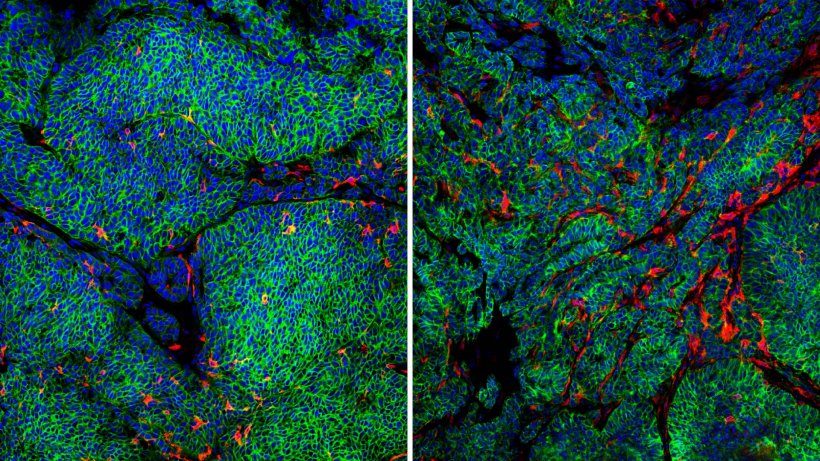
Image credit: Xue-Yan He, Egeblad lab, CSHL
News • Cross-presenting dendritic cells
How breast cancer sneaks past local immune defenses
Cold Spring Harbor Laboratory (CSHL) Associate Professor Mikala Egeblad and her colleagues describe a newly understood way by which breast cancer cells sabotage a key player in the body’s immune system.
That key player provides local immune surveillance by activating killer T-cells, but if it cannot mature and do its job, breast cancer cells can escape detection from the immune system, resulting in unnoticed and unhindered growth.
The researchers published their findings in the Journal of Experimental Medicine.
This delves into something that no one was really considering when blocking CCR2. It opens up new ideas to build even better therapies or use existing drugs in different ways
Miriam Fein
The key players in question are known as cross-presenting dendritic cells. These cells are important because they initiate and coordinate local immune responses by showing pieces of cancer cells to so-called killer T-cells. The killer T-cells can then detect and destroy the cancer cells.
The scientists found breast cancer cells use a protein on their surface, a so-called cell surface receptor called CCR2, in an unexpected way. It disrupts cross-presenting dendritic cell maturation. This was a surprise because CCR2 has a totally different function in immune cells, which use the receptor to guide themselves to areas of inflammation. However, when CCR2 receptors appear on the surface of tumor cells, they suppress the secretion of a signal that dendritic cells need to mature. The researchers are keen to learn more precisely how cancer cells use CCR2 to suppress those key proteins, but this new research finding is already helpful because CCR2 itself can be targeted. In 2012, the Egeblad lab revealed how blocking CCR2 on immune cells can improve the ability of drugs to penetrate tumors. Now, CCR2-blocking drugs are being tested in the clinic as a cancer treatment. These latest findings suggest that blocking CCR2 activity can also help the body’s own immune response to fight cancer. Postdoctoral researcher Miriam Fein adds: "This delves into something that no one was really considering when blocking CCR2. It opens up new ideas to build even better therapies or use existing drugs in different ways."
Source: Cold Spring Harbor Laboratory (CSHL)
19.07.2020











